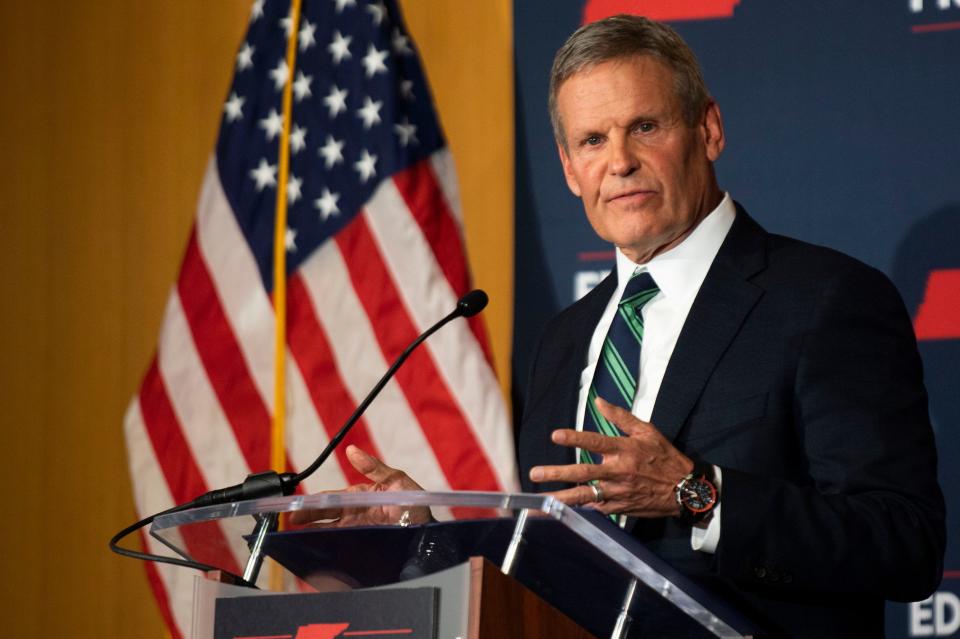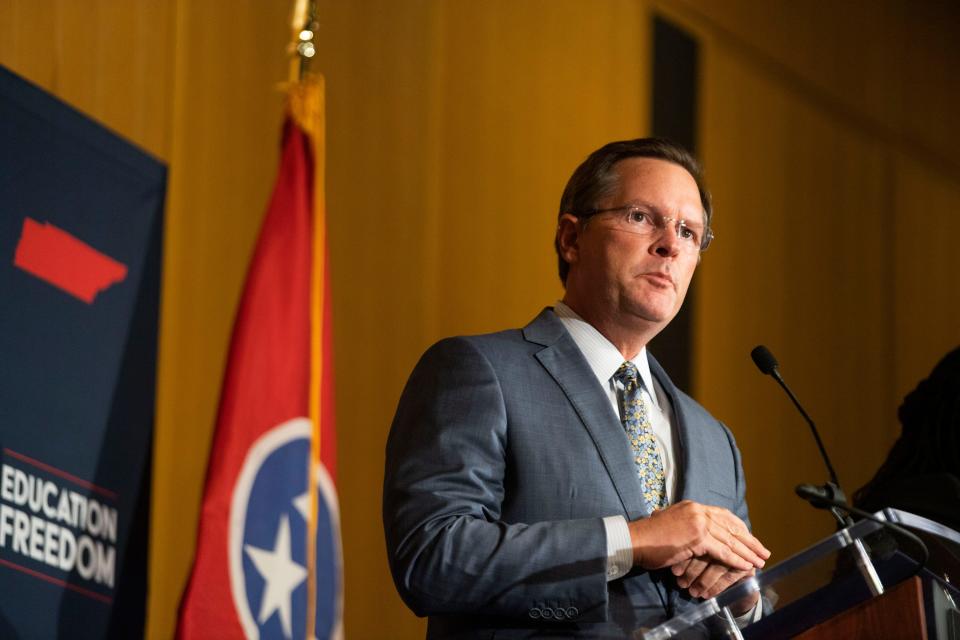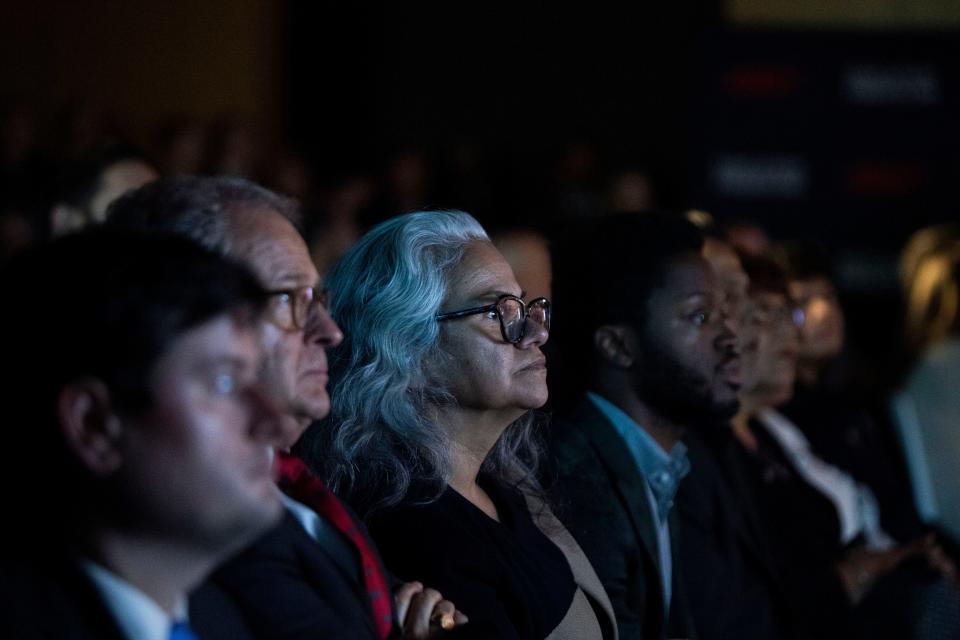Gov. Bill Lee welcomes a 'conservative education revolution.' Will public schools survive?
“You want a revolution. I want a revelation.” – Angelica Schuyler, a character in the musical “Hamilton”
“You say you want a revolution, Well, you know, We all want to change the world.” – “Revolution” by The Beatles
A revolution is about changing things, systems or governments so radically that they are never the same.
That word is seared in my mind after attending a public presentation Tuesday by Tennessee Gov. Bill Lee announcing the expansion of the Education Savings Account program, commonly called school vouchers.
The ESA program provides taxpayer money for parents who qualify to send their children to any type of school they want, including alternatives to public schools, such as, parochial, private or home schools.
Lee did not use the word “revolution” himself, but his guest, Arkansas Gov. Sarah Huckabee Sanders, did so. In the spring, Sanders signed legislation revamping public education in her state that will allow any parent to avail him or herself of the state’s voucher program.
“There is an absolute conservative education revolution in our country,” Sanders told the audience at the auditorium of the Tennessee State Museum that included reporters, lawmakers, lobbyists and activists who oppose ESAs.
Sanders said the revolution swept across Arkansas and added: “It will sweep across Tennessee.”
Governor Lee is not one to employ hyperbolic or provocative language, but Sanders’ presence is a sign that something big, transformative and disruptive is coming to the Volunteer State.
Counterpoint: Gov. Bill Lee is empowering families by expanding school choice in Tennessee
Statewide school voucher expansion appears to be inevitable
In a column I wrote Monday about Lee’s formal announcement, I called on Lee and legislative leaders to explain the math on the program and to provide assurances that they will continue to invest in public education.

On the first, I pointed out in the column that the expansion amounted to a 555% budget increase.
Today, the ESA program offers $9,000 to 2,400 low-to-middle income students in Davidson, Shelby and Hamilton counties, which totals $21.6 million
The statewide expansion, if approved by the Tennessee General Assembly, would include all 95 counties in the 2024-25 school year and offer $7,075 to 20,000 students or $141.5 million
Lee told reporters that the money for what he coined the Education Freedom Scholarship Act would be coming out of a different pot of money than K-12 education.
This was something confirmed to me by Rep. Scott Cepicky, R-Culleoka, who chairs the Education Instruction Subcommittee, and added that lawmakers plan to take their time with the legislation to avoid “unintended consequences.”
But it was clear, given comments from Lt. Gov. Randy McNally, R-Oak Ridge, and House Speaker Cameron Sexton, R-Crossville, at the presentation, this is going to happen.
Sexton and Lee both addressed the second point of preserving public education.

“This is no longer about defunding public education," Sexton said. "It is now about finding a quality education for your child."
Lee said it’s “a false choice” that Tennessee can’t offer more options to parents and also beef up public schools.
“Tennessee should have the best public school system in the country. I still believe that,” the governor said.
Hear more Tennessee Voices: Get the weekly opinion newsletter for insightful and thought provoking columns.
Local communities support public schools. Will that matter?
Parents deserve high quality education choices, and the philosophy of expanding ESAs is to allow the money to follow the student and not the school.
But this money is not infinite, and, if one day, the program opens to nearly all 1 million K-12 students, what will that mean for public education?
The capacity for alternatives to public schools to absorb that many students may not be possible now, but could that be the ultimate goal?
The public deserves to know the details about how the program works, where the money comes from and where scarce resources will be taken from to pay for the ESA expansion.

Communities in Tennessee's rural and urban areas alike have tended to support their public schools, which is typically the top funded local budget priority.
In the wake of a potential “conservative education revolution” in Tennessee, however, progressive critics need to make the case for why public education matters to parents who feel either their children’s needs are or aren’t being served well. Facts will trump hyperbole, and mobilizing parents and other stakeholders to tell their stories to their lawmakers during the 2024 legislative session starting in January will alo be important.
On Tuesday, Governor Lee lamented that nine states had surpassed Tennessee in offering “universal school choice” since he proposed ESAs in 2019.
He is intent on wanting to catch up and pass them by and in doing so, invite that conservative revolution that will shake up public education in Tennessee forever.
David Plazas is the director of opinion and engagement for the USA TODAY Network Tennessee. He is an editorial board member of The Tennessean. He hosts the Tennessee Voices videocast and curates the Tennessee Voices and Latino Tennessee Voices newsletters.. Call him at (615) 259-8063, email him at [email protected] or tweet to him at @davidplazas.
This article originally appeared on Nashville Tennessean: School vouchers may herald dire Tennessee public schools changes